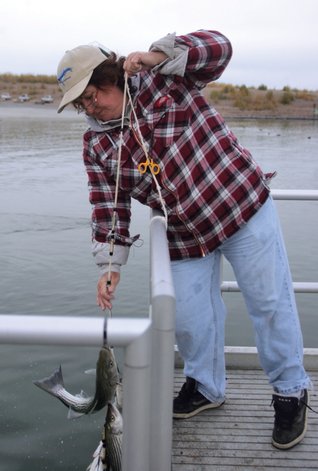
Trish Hayes checks her days catch at the Boulder Harbor dock in this file photo from December. Natural causes have made it difficult for the Nevada Department of Wildlife to keep the lake stocked with fish in 2009.
Wednesday, March 4, 2009 | 7:26 p.m.
Decreasing water levels at Lake Mead coupled with the spread of invasive quagga mussels have made the lake increasingly difficult to stock with fish.
Nevada Department of Wildlife fish biologist Jon Sjoberg said a two-year drought, which has lowered Lake Mead's waters, along with the quagga mussel, which has impacted the lake's ecosystem since discovered in January 2007, have led to what is expected to be an 11 percent drop in fish stocking for 2009.
The department's 2009 fish stocking goals, which were released this month, have Lake Mead pegged to receive 51,000 trout. Last year, it received 56,912 trout.
"We have two big issues with the quagga mussels and going into the third year of a drought," Sjoberg said. "Based on the snowpacks in the mountains it looks like it's not shaping up to be a very good year."
Most of Lake Mead's trout are stocked between January and March. During the summer, trout cannot survive in the lake because it is too hot—another effect from lower water levels.
The invasive mussels have forced the fish hatchery at Lake Mead, which once provided 400,000 trout a year, to suspend operations in May 2007
With their main trout supplier gone, Southern Nevada's fishing waters are receiving most of their stock from Mesa Valley Hatchery in Yerington.
"The real problem for us is we have to bring them down from northern Nevada," Sjoberg said. "When you have to drive the fish 350 miles, there is a cost issue to that."
In total, the waters of Clark, Nye and Lincoln counties are expected to receive 354,950 fish in 2009.
The numbers may change, however, as the department's report is just a goal, not an exact quota.
Sjoberg said the change will be small and not noticeable to most local anglers, especially those who frequent Clark County's urban ponds.
"I don't think people will notice much of a difference in Clark County," he said. "We get a lot of activity from those urban ponds and we don't want that to go down. If we have to cut fish we will cut the fish from the urban ponds last."
Jake Sunderland, spokesman from the department's Reno office, said northern fishing waters will be helped by the reopening of Galleger Fish Hatchery in Elko County.

Join the Discussion:
Check this out for a full explanation of our conversion to the LiveFyre commenting system and instructions on how to sign up for an account.
Full comments policy